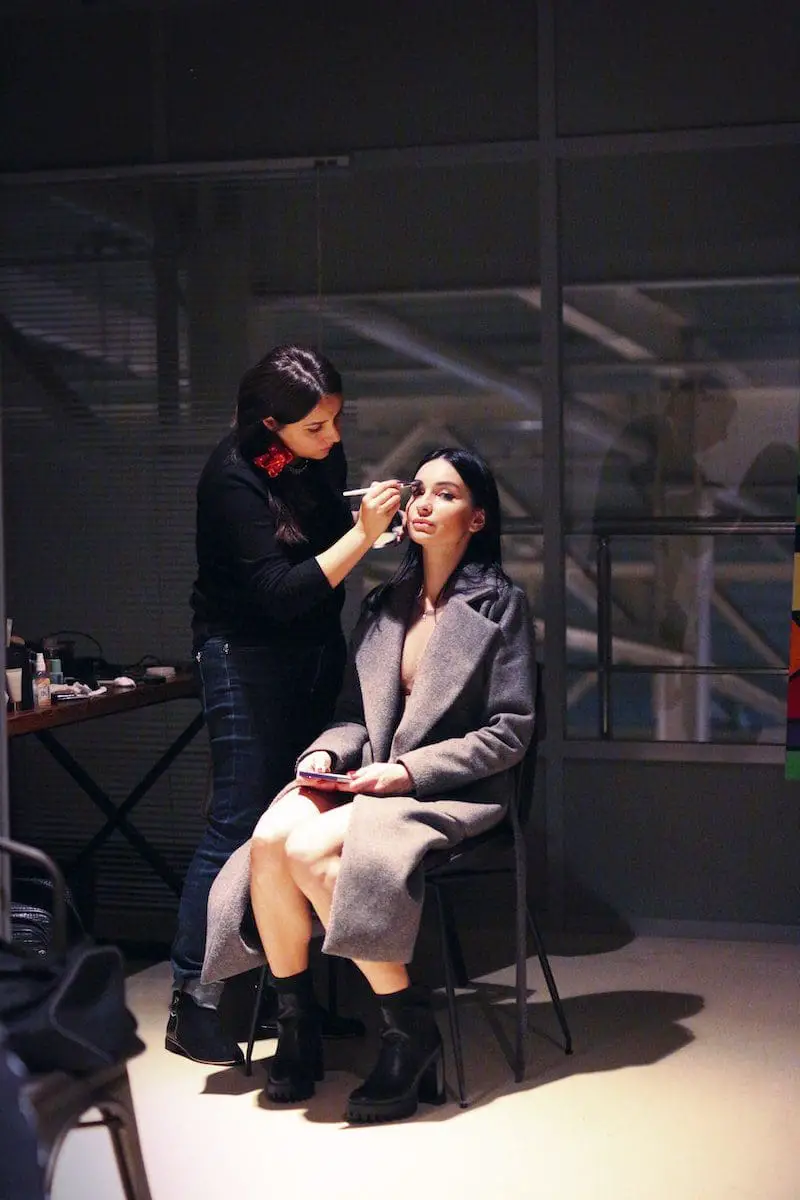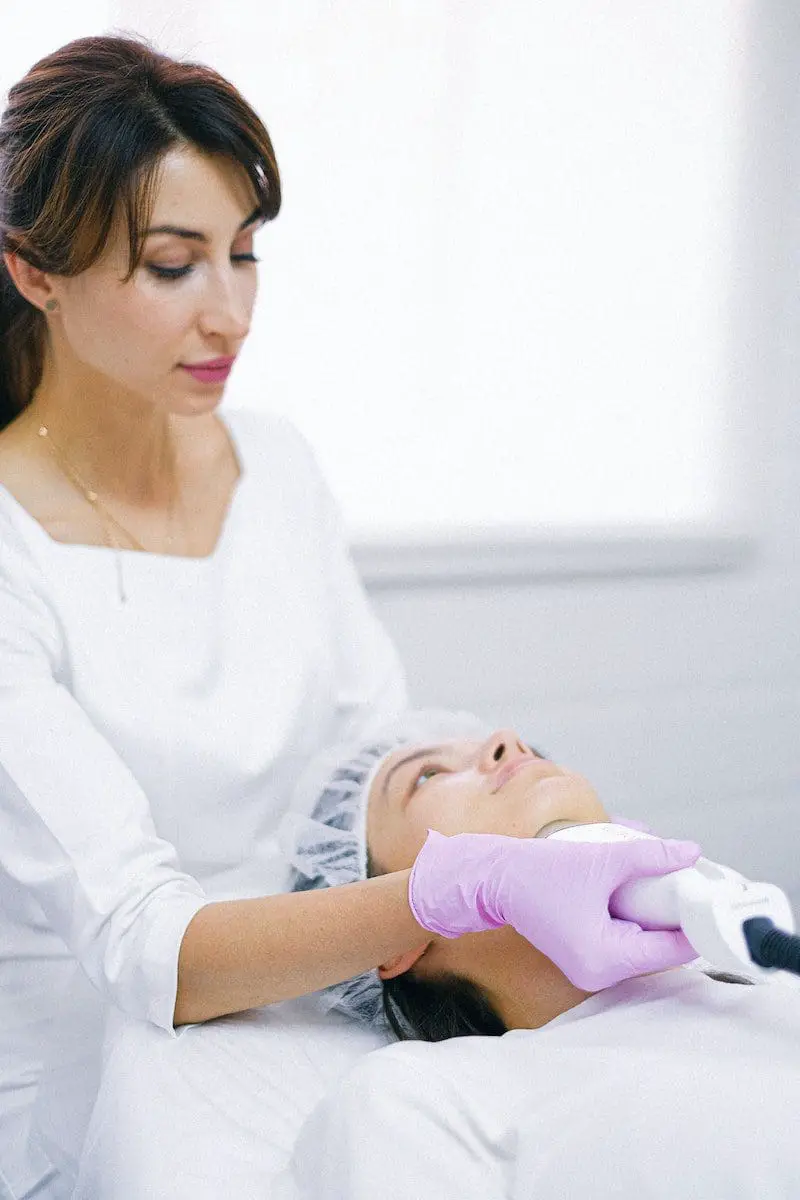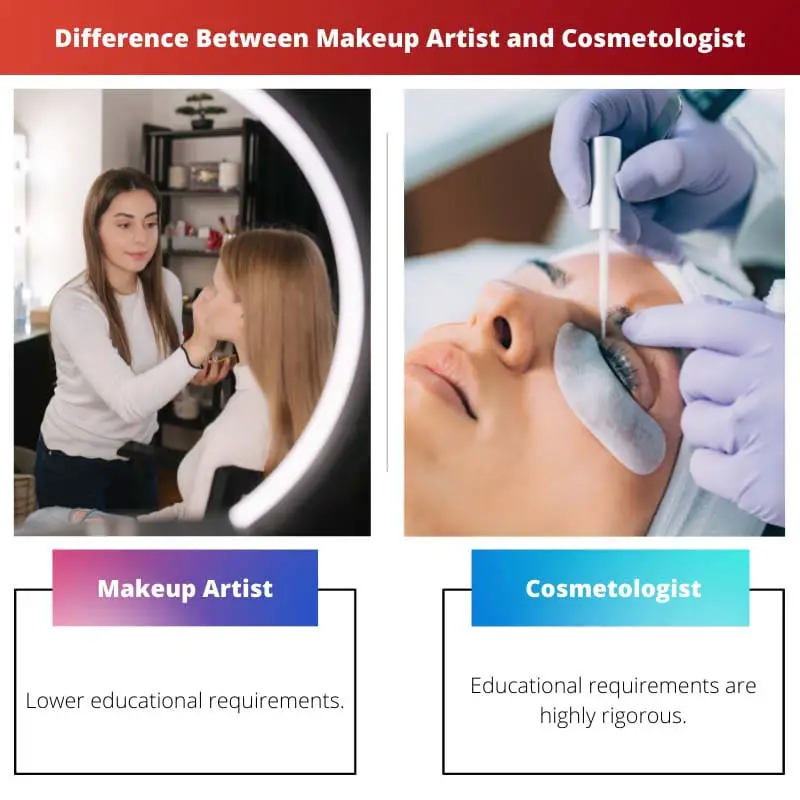In today’s world scenario, outer beauty and presentation also surpass inner beauty and innocence. Thus, cosmetologists and makeup artists are very important to everyone in the limelight.
People sometimes get confused between the two similar terms, cosmetologist and makeup artist. As both the makeup artist and cosmetologist work in the glamour and beauty industry, they are seen as one, although different.
Their education and training overlap a lot. Thus, it can be justified why people mix these two terms up.
However, there lie some key differences between these two terms as well. This article will discuss the two professions and how a makeup artist differs from a Cosmetologist.
Key Takeaways
- A makeup artist specializes in applying makeup to enhance or alter a person’s appearance.
- A cosmetologist is a professional trained in a wide range of beauty treatments, including hair, skin, nail care, and makeup application.
- A cosmetologist can also provide more advanced treatments, such as chemical peels and microdermabrasion.
Makeup Artist vs Cosmetologist
A makeup artist does makeup only. However, a cosmetologist knows about hair, skin, and nails too, and thus can meet the demand of the customer regarding the same. Any layman can become a makeup artist if he or she learns the makeup tutorials. However, only educated people with a minimum educational qualification and finishing their courses from a recognized institution can study Cosmetology.

To become a makeup artist, no formal degree or education is required at all. Any layman having no educational qualification can also avail of the makeup course.
They do not have the authority to do anything else, like hair or nails. No such eligibility is required to be a makeup artist. To avail of a makeup artist course, no perquisites are required.
Completing makeup courses does not provide people with a degree. Rather it just teaches them basic makeup tutorials.
A cosmetologist needs to finish a course in cosmetology. A Cosmetologist works not only on makeup but also on nails, hair, and skin. One can become a Cosmetologist if he completes a degree and thus is eligible.
A minimum qualification needs to be achieved before going for the Cosmetologist course. A Cosmetologist gets a recognized degree only after completing the cosmetologist course.
Comparison Table
| Parameters of Comparison | Makeup Artist | Cosmetologist |
|---|---|---|
| Educational requirements | Lower educational requirements. | Educational requirements are highly rigorous. |
| Job opportunities | Limited job opportunities. | Job opportunities are plenty and possibly higher earning as well. |
| Education | No formal degree or education is required. | A course in cosmetology needs to be done. |
| Area of work | Makeup. | Makeup, hair, nails, skin. |
| Eligibility | No such eligibility is required. | Eligibility of completing a degree is required. |
| Minimum Qualification | No perquisites required. | One needs to get a minimum qualification to study Cosmetology thereafter. |
| Degree | Is not a degree holder, knows basic makeup tutorials. | Is a recognised degree holder. |
| Job Offer | Have a basic job after completing the course. | Can begin his own business or practice. |
What is Makeup Artist?
The make-up artists are well versed in the recent and latest trends in the market related to fashion and glamour. However, they would prove insufficient when skincare, nail care, or hair care issues arise.
Makeup artists stick to makeup only. They do not even switch to hair styling also. For makeup artists, other courses are also available. They focus on practical knowledge and try to fetch people with a basic job.
No prior experience or education is required for the same. Those completing makeup courses get a certificate, but any institution does not recognize the certificates as an educational qualification.
But it allows the candidate to join a basic job or start one. A makeup artist can get a decent job with basic pay at a salon, spa, or parlor.
Makeup artists with extraordinary skills can be picked up by film units as well. Makeup artists can have a basic job at a salon or beauty spa after they finish the course.

What is Cosmetologist?
Cosmetologists are well-versed in the therapies, treatments, and amazing practices related to nail care, skincare, and hair care. They take up other work, such as nail maintenance and hairstyling as well.
The cosmetology courses are tough and very intense. It requires a person to have a minimum school education. Completing the course provides the candidate with the license to start practicing in any existing institution or the start of its own.
The central and state boards also recognize cosmetology courses. After finishing this course, the candidates would not be well versed with the latest trends in fashion and style. Particular fields to work with need to be selected by the candidate himself.
The candidate can clearly state board examinations, and the main purpose of these courses is to educate the candidate and fetch him a degree and later a decent and secure job.

Main Differences Between Makeup Artist and Cosmetologist
- No formal degree or education is required to become a makeup artist. However, to become a cosmetologist, one must finish a cosmetology course.
- The area of work of makeup artists is only makeup. However, cosmetologist works not only on makeup but hair, nails, and skin too.
- No such eligibility is required to become a makeup artist. However, particular eligibility for completing a degree is required to become a cosmetologist.
- To do a makeup artist course, no perquisites required. On the other hand, one needs to get a minimum qualification to finally do a Cosmetologist course.
- Makeup courses do not give people the degree but rather basic makeup tutorials. However, finishing a cosmetology course fetch you a recognised degree.
- Makeup artists can have a basic job after they finish the course. On the contrary, a cosmetologist, with the help of his degree, can start his own business and practice.

- http://jpk.ppj.unp.ac.id/index.php/jpk/article/view/768
- https://link.springer.com/content/pdf/10.1007/978-3-319-68617-2_142.pdf

The article is very informative and provides a clear understanding of the roles and qualifications for makeup artists and cosmetologists.
This article excellently describes the roles of makeup artists and cosmetologists and clarifies the distinction between the two, offering valuable insights into their areas of expertise.
I found it very informative and well-structured.
The article provides a thorough comparison between the educational requirements and job opportunities for makeup artists and cosmetologists, highlighting the significance of having a recognized qualification.
I appreciate the detailed insights provided in the article.
Yes, it emphasizes the importance of education and training in these fields.
This article does a great job of outlining the key differences between a makeup artist and a cosmetologist, clearing up any misconceptions that may exist.
I agree. It is very informative and well-written.
This article effectively distinguishes the areas of work and eligibility criteria for makeup artists and cosmetologists, offering valuable information to those interested in these professions.
Agreed. This article sheds light on important aspects of both professions.
I found it very enlightening and informative.
This article offers a detailed comparison of the educational qualifications, job prospects, and roles for makeup artists and cosmetologists, making it a valuable resource for those interested in pursuing a career in these fields.
Agreed. It’s an enlightening read.
The article is informative and well-structured.
I appreciate the detailed information provided in the article.
The comparison table presented in the article provides a clear and concise overview of the differences between makeup artists and cosmetologists, making it easier to understand their respective roles and qualifications.
Absolutely, the tabular format effectively summarizes the contrasting features of these two professions.
I appreciate the detailed comparison provided in the article.
The article effectively differentiates between the work and educational requirements of makeup artists and cosmetologists, providing a comprehensive analysis of their respective fields.
I agree. It’s a well-researched and insightful piece.
The article effectively outlines the minimum qualifications and degrees required for makeup artists and cosmetologists, highlighting the contrasting educational pathways for these professions.
Indeed, it’s a comprehensive analysis of these professions.